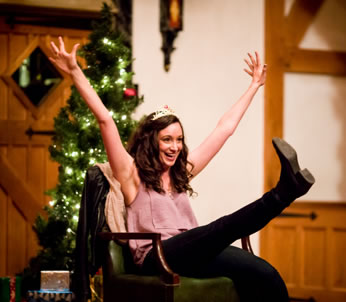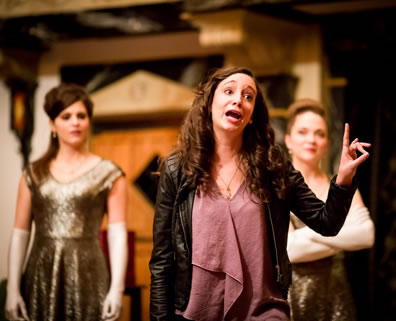The Twelve Dates of Christmas
The Play beyond the Playwright
By Ginna Hoben
American Shakespeare Center, Blackfriars Playhouse, Staunton, Va.
Wednesday, Dec. 23, 2015, C–6&7 (center stalls)
Directed by Jim Warren

Stephanie Holladay Earl plays Mary in the American Shakespeare Center's production of Ginna Hoben's The Twelve Dates of Christmas at the Blackfriars Playhouse. Photo by Lindsey Walters, American Shakespeare Center.
This is the first Ginna Hoben play we've seen that didn't star Ginna Hoben. That was half the reason we slipped this 90-minute production of The Twelve Dates of Christmas into our short visit to Staunton, Virginia, on our eve of Christmas Eve travels (our Staunton stop also allowed us to see Allison Glenzer as Scrooge in the American Shakespeare Center's production of A Christmas Carol). The other reason to see Twelve Dates a third time was explicitly to see Stephanie Holladay Earl playing the part of Mary in what is ostensibly a one-woman show (but not entirely so, as will be explained). Holladay Earl is an actress whose work I've admired since I first saw her on the Blackfriars Playhouse boards five years ago.
Turns out two halves make up more than a whole. Holladay Earl is as scintillating as expected, while Hoben's script grows richer in Holladay Earl's performance.
We saw Hoben's world premiere of Twelve Dates at the Blackfriars in 2010. Intending to add a woman's voice to annual holiday theater fare, Hoben wrote a monologue centered on the character of Mary who breaks up with her fiancé on Thanksgiving Day (she sees him on TV at the Macy's Parade smooching with another woman) and spends a year's worth of holidays engaging in romantic misadventures and stumbles. We saw Hoben perform her play again a year later after she had honed the script. Earlier this year, we saw her premiere No Spring Chicken, another one-woman show, about "advanced maternal age" (recounting her own post-40 pregnancy).
Both plays have some autobiographical basis (Mary in Twelve Dates is an actress working at a coffee shop, as Hoben was), but fact and fiction are definitely blurred in the story telling. For example, I know which of Mary's 12 dates was with the man she eventually would marry, and I know that the germination of one of Mary's wild one-night stands is merely the name of one of Hoben's friends. Obviously, I'm closer to this play and the playwright than the typical observer, but inserting the distance of time (four years) and personality (Holladay Earl playing Mary instead of the role's creator) between the piece and me has allowed me a more neutral perspective on the play.
At times, Holladay Earl's Mary sounds a lot like Hoben's Mary. At other times, Holladay Earl reaches a level of pathos Hoben didn't attain with her own character. Hoben's Mary could shrug off the heartache a little easier, always seeming to be in control, however tenuous, of her destiny. Holladay Earl's Mary lets us feel her heartache more deeply—which, in turn, allows the play's comedy to erupt more satisfyingly—and she plays up the helplessness Mary feels in romance when other people and forces seem to be controlling our fate, a feeling we all know too well.
Even when fate itself intervenes, it's pulling different strings than you think it is. Mary is certain that, when she and a good-looking stranger are alone on a New York subway platform just after midnight on New Year's morning and the public phone rings, it is an omen, a sign: destiny. And it does prompt her to start talking with, and dating, that stranger, Dr. John. Too few wonderful dates pass, though, before she discovers that destiny is not so tidy. "How could I fixate on the ringing of a filthy f*****g public pay phone, yet ignore flesh-and-blood facts?" she rails, finally wondering, who calls a subway platform pay phone at one in the morning? "I loved believing it was some supernatural force bringing us together. Now, I have to believe it was some wrong number. Or a drug deal. Or pimp!" and Holladay Earl's Mary shudders at that particular association. Yet, that ringing phone does end up leading to a long-standing relationship and landing Mary a date for St. Patrick's Day—ironically with her presumed rival for Dr. John.
It's such intertwining of plot and subplots through Mary's year of failed and near romances that elevates Twelve Dates from being a stand-up comedy routine to a bona fide play. In fact, though it uses just one actress, that actress plays a total of 13 roles, each with a different dialect and mannerisms. Holladay Earl dives into each character's core; the slacker musician, Waiter Bob, for example, has a heart of gold even as he's breaking Mary's heart. Hoben's script draws Mary's Ohio mother, her sister Exercise Sally, and her Southern drawling Aunt Kathy with a bit of caricature, but Holladay Earl delivers each as real, sympathetic personalities.
Mary grows increasingly annoyed with her family's meddling ways, and this leads to a six-month feud of silence. It's interesting to note, however, that Aunt Kathy set Mary up with Mr. Right at the very beginning (if Mary hadn't been so stubborn over protocol, the play would end on the first Christmas after breaking up with her fiancé, not the second Christmas), and she met two other candidates for lifelong happiness at her sister's wedding—a far better record than Mary accomplished using her own devices of public pay phones ringing and bartenders with adorable asses. In the first performances of this play I recall the intrafamily feud as being comical silliness; Holladay Earl depicts the feud as something not so trite, but rather a nagging psychosis that Mary herself must work through.
Holladay Earl also uses the audience as part of Mary's alter ego. She walks into the stalls, she high-fives members of the audience after a right decision, she gets the audience involved in Mary's conflicted decision of whether to kiss her old friend—and date—on New Year's Eve (in our audience, the vote was a resounding yes). On the night we attended, Holladay Earl, speaking the play's opening speech, wanders to the side of the stage where Ralph Alan Cohen, ASC co-founder and director of mission, is sitting. She is describing the true meaning of Thanksgiving, a holiday in which "we take time throughout the day to touch each other on the arm—like in the Folgers' commercials—and express how thankful we are for one another. For our health. Our jobs," and Mary says this with Holladay Earl's hands firmly clasped on her boss' shoulders.
This direct engagement and physical interaction with the audience—and Holladay Earl's riffing on subsequent reactions—loosens the shackles of theater formality in the crowd. People more readily respond vocally to Mary's predicaments and decisions, and when her ex-fiancé shows up on Thanksgiving eve one year on from his cheating on Mary, the lady sitting next to me muttered an expletive (she had been emitting a number of "Uh-oh"s and "Oh, boy"s throughout the performance, but she let loose on the ex-fiancé, and it was obvious she had never seen this play before). Hoben, herself a veteran of the Blackfriars Playhouse's singular play space (universal lighting, the stage hemmed in on three sides by the audience) wrote Twelve Dates with such interactions in mind, and Holladay Earl, with ASC Co-Founder and Artistic Director Jim Warren directing, gets maximum effect out of the practice.
The Twelve Dates of Christmas, though, is not officially a one-woman play. Hoben wrote two versions, one for a solo performer, and one with the "Doo-Wop Girls," two women singing thematic musical interludes and serving as sort of a Greek chorus for Mary—or, more aptly, her wiser conscience. Susie Parr and Zoe Speas play the pair dressed in glittering gold cocktail dresses designed by Jenny McNee, and, despite the impressive talents of Holladay Earl on the stage, the two Doo-Wop Girls nearly steal the show from their perch in the gallery above the stage. Musically, they are superb, providing scintillating harmonies on such standards as "Twelve Days of Christmas," "Auld Lang Syne," "Three Drunken Maidens," "Mama Said," and Alanis Morissette's "You Oughta Know." They also watch much of the play, laser-focused on Holladay Earl and reacting with smiles, frowns, concern, and resignation at Mary's decisions.

Mary (Stephanie Holladay Earl) backed by the Doo Wop Girls, Zoe Speas (left) and Susie Parr, lectures her ex-fiancé when they meet by chance one year after their break-up on Thanksgiving in the American Shakespeare Center's production of Ginna Hoben's The Twelve Dates of Christmas at the Blackfriars Playhouse. Photo by Lindsey Walters, American Shakespeare Center.
They join the action when she encounters her ex-fiancé, rooting her on during her great speech about how he is a dog—"Except dogs are loving and loyal," a line Mary stole from her one-time rival Maggie. But this speech is all in her imagination. In reality, Mary agrees to join him for coffee, listens to his mea culpas over too many cuppas, and when he invites her to join him for Thanksgiving Day, she's about to agree when the Doo-Wop Girls join in on a solid right hook to Mary's jaw.
I'll not spoil the rest, except to say that the play gets beyond this second Thanksgiving to a second Christmas. Though this play runs through every American holiday (even Labor Day, which Mary spent in a Vermont cabin with eight lesbians and a dog), it ends as a Christmas story. It is through her playing the Ghost of Christmas Past in a production of Charles Dickens' A Christmas Carol (and Holladay Earl does, indeed, play that part in ASC's production, as did Hoben before her) that Mary finds true love. The 5-year-old boy playing Tiny Tim—whom Mary affectionately calls Tater Tot—never fails to get coos from the audience in Holladay Earl's portrayal of him. And it is on Christmas day, when Mary lets go of attempting to manage the emotional tides of her life, that she not only finds peace but understanding, and perhaps—perhaps—Mr. Right in a man she had earlier dismissed as Mr. All-Wrong.
Since its premiere on this stage five years ago, The Twelve Dates of Christmas has been produced 29 times from Birmingham, England, to Shanghai, China. Clearly, the script stands up and could yet end up an annual holiday classic, as it has become at the Blackfriars Playhouse. Clearly, as Holladay Earl and Hoben before her demonstrate, Twelve Dates exceeds the experience of one woman.
Eric Minton
December 23, 2015
Comment: e-mail editorial@shakespeareances.com
Start a discussion in the Bardroom



 Find additional Shakespeareances
Find additional Shakespeareances